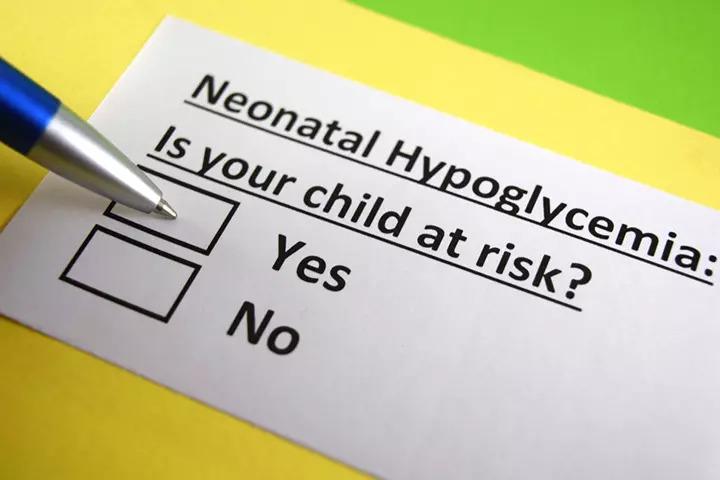Neonatal hypoglycemia is a common metabolic problem where the newborn’s blood glucose levels are less than their body’s requirement for energy and metabolism.
Healthy newborns may also develop transient hypoglycemia while adapting to extrauterine life. However, the decline of plasma glucose level to lower than 30 mg/dL (1.65 mmol/L) within the first 24 hours of life and less than 45 mg/dL (2.5 mmol/L) after 24 hours is considered neonatal hypoglycemia.
Read this post to know more about the causes, risk factors, signs, symptoms, diagnosis, and neonatal hypoglycemia management.
Causes Of Neonatal Hypoglycemia
The depletion of stored glycogen combined with impaired gluconeogenesis (formation of glucose) results in hypoglycemia in babies.
Neonatal hypoglycemia can be due to various reasons (1).
- Persistent hyperinsulinemic hypoglycemia of infancy (PHHI) is a disorder of glucose homeostasis (regulation of blood sugar) and is a common cause of hypoglycemia in newborns.
- Reduced glycogenolysis (making glucose from stored glycogen)
- Failure of gluconeogenesis (formation of glucose)
- Limited storage of glycogen due to premature birth or intrauterine growth problems
- Depleted glycogen stores in babies with asphyxia (inadequate oxygen supply to the body), perinatal stress, or starvation
- Adrenal insufficiency may cause hypoglycemia due to increased insulin sensitivity caused by depleted cortisol
- Congenital hyperinsulinism can be due to abnormalities in the pancreatic cells
- Early infections and disorders, such as sepsis or liver disease
Risk Factors For Neonatal Hypoglycemia
The following factors may increase the risk of neonatal hypoglycemia (2).
- Macrosomia (larger baby than average size) usually occurs due to maternal diabetes mellitus during pregnancy
- Chorioamnionitis (infection of amniotic membranes) treatment during intrauterine life
- Cesarean section
- Low gestational age (prematurity)
Monitoring and appropriate feeding in higher risk newborns could help reduce the risk of complications.
Signs And Symptoms Of Neonatal Hypoglycemia
Some babies can be asymptomatic during the first couple of days of life. However, most infants develop life-threatening cardiopulmonary and central nervous system problems due to low blood glucose levels.
Common signs and symptoms of neonatal hypoglycemia could include (3):
- Poor feeding
- Hypotonia (poor muscle tone)
- Seizures
- Cyanosis (bluish skin discoloration)
- Congestive heart failure
- Hypothermia
- Lethargy
- Apnea (paused breathing)
Hypoglycemia usually activates the autonomic nervous system in non-diabetic individuals. You may notice the following symptoms if your baby has autonomic nervous system stimulation (3).
- Increased heart rate
- Pallor
- Nausea
- Vomiting
- Hunger
- Sweating
- Anxiety
- Quivering or shaking
- Floppy or lose muscles
The drop in blood glucose can also lower the glucose levels in the cerebrospinal fluid (CSF). It can lead to a shortage of glucose in the brain, leading to the following manifestations.
- Behavioral changes
- Abnormal stare
- Seizures
- Coma
- Stroke
Seek immediate medical care if you notice any symptoms of hypoglycemia in your newborn baby.
Diagnosis Of Neonatal Hypoglycemia
The following laboratory tests are ordered to diagnose neonatal hypoglycemia (4).
- Plasma or serum glucose level test
- Serum insulin test
- Urinalysis to find the presence of organic acid and ketones
- Metabolic errors screening to identify any inborn errors of metabolism
Additional tests could be required to determine or rule out the presence of adenoma (tumors) that could lead to hypoglycemia.
Treatment For Neonatal Hypoglycemia
Immediate management helps to prevent neurological damages due to hypoglycemia in babies. The treatment options may include the following (5).
- Early feeding with breast milk or formula can be beneficial for conscious and alert babies, and there is no risk of aspiration.
- Intravenous (IV) nutrition could be preferred for babies who have the risk of aspiration and cannot feed themselves.
- Diazoxide administration is useful to suppress insulin secretion in severe hyperinsulinemia due to adenoma or inborn metabolism errors.
- Medications, such as dextrose, octreotide, and glucagon, are used to increase glucose levels.
- Near-total pancreatic resection (surgical removal of 85-90% of the pancreas) is required if there is pancreatic adenoma-induced hypoglycemia, which is unresponsive to other treatments.
The American Academy of Pediatrics recommends admission to neonatal intensive care units and intravenous administration of dextrose (glucose) for the following cases of hypoglycemia (6).
- Asymptomatic neonates with glucose lower than 25 mg/dL within the first four hours of life and less than 35 mg/dL at four to 24 hours of life
- Symptomatic neonates with glucose less than 40 mg/dL
- Persistent hypoglycemia regardless of frequent feeding
All high-risk infants are screened at birth and treated if required.
Complications Of Neonatal Hypoglycemia
Hypoglycemia could affect the brain and its functions. Neurological damage may result in long-term effects, such as seizures, poor cognitive function, personality disorders, and developmental delay (6).
The visual cortex that processes vision could also be affected. It may impact eyes and optic nerve development. Other complications include adverse effects on cardiovascular function. Severe prolonged hypoglycemia can be fatal if left untreated. Babies with asymptomatic hypoglycemia are often prone to long-term complications due to possible delays in diagnosis and interventions.
Hypoglycemia in babies is a common condition that could be a result of any underlying problem or factor. Babies with a high risk should be screened soon after birth. Although frequent breastfeeding could prevent hypoglycemia in many newborns, it may not be adequate for babies with inborn errors of glucose metabolism and other congenital problems. Speak to your child’s doctor to determine the best treatment course to avert long-term complications.

